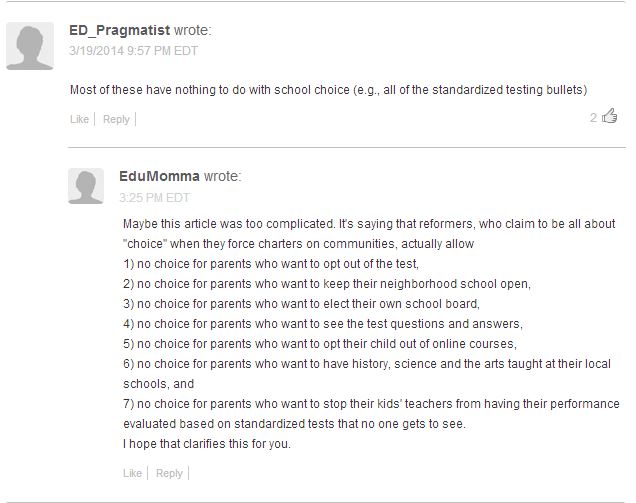Friday Freakout: School Choice Supporters Only Want Choice on Their Terms
Today’s freakout comes to us from the comments of a post entitled “School reformers love ‘choice,’ except when…,” which appeared this week on Valerie Strauss’ Washington Post blog The Answer Sheet. We’ll cut to the chase.

This is a classic example of: EduMomma see. EduMomma do.
Strauss and many others are using their access to powerful communication channels and a classic psychological method to condition masses of people to oppose school choice. How? First, get people worked up over a widely hated concept (or seven), then couple them with a term you want people to associate with that feeling of contempt. Repeat and, soon, they will. The only way to accomplish this conditioning faster is to make factually baseless claims that seem logical on the surface.
But there’s another problem. Strauss assumes all school reformers are in lockstep. The Friedman Foundation’s positions prove otherwise:
Strauss: Parents decide they want to opt their children out of taking a high-stakes standardized test that has little or no value.
Friedman: Testing should be driven by parents, not politicians and bureaucrats. School choice is the ultimate opt-out. The more parents opt-out, the more likely public school policies are to change to fit demand.
Strauss: Parents prefer that their neighborhood school stays open and gets the resources to improve it rather than have it closed as a failing school.
Friedman: Localities, parents and voters, should decide the fate of their neighborhood schools. School choice puts that vote in parents’ hands.
Strauss: Parents want to elect school boards to govern their school district but local education authority is given to mayors (though only to those mayors that agree with policy-makers).
Friedman: Whether through their school choice or election vote, families should be in charge—not those in the state capitol.
Strauss: Parents want to see their child’s standardized tests after completion.
Friedman: Parents should get frequent feedback on how their children are doing. School choice gives them recourse if they don’t.
Strauss: Parents don’t want their children to take any on-line courses.
Friedman: No school model should be forced on children. School choice helps parents choose among a variety of options including public, private, charter, or online services.
Strauss: Parents want their local public school to have a well-rounded curriculum that includes history, science, the arts and physical education.
Friedman: Parents should be able to select schools based on a variety of factors, including the offered curriculum. School choice provides exactly that.
Strauss: Parents don’t want their children’s teachers evaluated on the basis of student standardized test scores because they know it is unfair.
Friedman: In the current education system, a one-size-fits-all tool for measuring teachers is unfair. School choice gives parents the ability to do their own assessing and rewarding of teachers.
As you can see, all school choice supporters do not have identical philosophies on all other education issues, no matter how often opponents try to lump everyone into a one-size-fits-all category.
If you’re new to the issue of school choice, we hope you examine commentary on the subject with a careful eye.
We can proudly say that our organization never hides its advocacy under a guise of objectivity, is always transparent, and seeks to present facts without preying on people’s emotions. Can the same be said for other sources?




